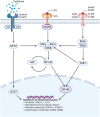Anti-inflammatory properties of commonly used psychiatric drugs
- PMID: 36704001
- PMCID: PMC9871790
- DOI: 10.3389/fnins.2022.1039379
Anti-inflammatory properties of commonly used psychiatric drugs
Abstract
Mental health and neurodevelopmental disorders are extremely common across the lifespan and are characterized by a complicated range of symptoms that affect wellbeing. There are relatively few drugs available that target disease mechanisms for any of these disorders. Instead, therapeutics are focused on symptoms and syndromes, largely driven by neurotransmitter hypotheses, such as serotonin or dopamine hypotheses of depression. Emerging evidence suggests that maternal inflammation during pregnancy plays a key role in neurodevelopmental disorders, and inflammation can influence mental health expression across the lifespan. It is now recognized that commonly used psychiatric drugs (anti-depressants, anti-psychotics, and mood stabilizers) have anti-inflammatory properties. In this review, we bring together the human evidence regarding the anti-inflammatory mechanisms for these main classes of psychiatric drugs across a broad range of mental health disorders. All three classes of drugs showed evidence of decreasing levels of pro-inflammatory cytokines, particularly IL-6 and TNF-α, while increasing the levels of the anti-inflammatory cytokine, IL-10. Some studies also showed evidence of reduced inflammatory signaling via nuclear factor- (NF-)κB and signal transducer and activator of transcription (STAT) pathways. As researchers, clinicians, and patients become increasingly aware of the role of inflammation in brain health, it is reassuring that these psychiatric drugs may also abrogate this inflammation, in addition to their effects on neurotransmission. Further studies are required to determine whether inflammation is a driver of disease pathogenesis, and therefore should be a therapeutic target in future clinical trials.
Keywords: anti-depressants; anti-psychotics; inflammation; mental health; mood stabilizers.
Copyright © 2023 Patel, Keating and Dale.
Conflict of interest statement
The authors declare that the research was conducted in the absence of any commercial or financial relationships that could be construed as a potential conflict of interest.
Figures

Similar articles
-
[Hepatitis C, interferon a and depression: main physiopathologic hypothesis].Encephale. 2005 May-Jun;31(3):349-57. doi: 10.1016/s0013-7006(05)82400-5. Encephale. 2005. PMID: 16142050 Review. French.
-
Methanol extracts of Xanthium sibiricum roots inhibit inflammatory responses via the inhibition of nuclear factor-κB (NF-κB) and signal transducer and activator of transcription 3 (STAT3) in murine macrophages.J Ethnopharmacol. 2015 Nov 4;174:74-81. doi: 10.1016/j.jep.2015.07.038. Epub 2015 Jul 29. J Ethnopharmacol. 2015. PMID: 26232627
-
Impact of miR-223-3p and miR-2909 on inflammatory factors IL-6, IL-1ß, and TNF-α, and the TLR4/TLR2/NF-κB/STAT3 signaling pathway induced by lipopolysaccharide in human adipose stem cells.PLoS One. 2019 Feb 26;14(2):e0212063. doi: 10.1371/journal.pone.0212063. eCollection 2019. PLoS One. 2019. PMID: 30807577 Free PMC article.
-
Coccomyxa Gloeobotrydiformis Polysaccharide Inhibits Lipopolysaccharide-Induced Inflammation in RAW 264.7 Macrophages.Cell Physiol Biochem. 2018;51(6):2523-2535. doi: 10.1159/000495922. Epub 2018 Dec 11. Cell Physiol Biochem. 2018. PMID: 30562752
-
[Lipids, depression and suicide].Encephale. 2003 Jan-Feb;29(1):49-58. Encephale. 2003. PMID: 12640327 Review. French.
Cited by
-
Association of Peripheral Inflammatory Biomarkers and Growth Factors Levels with Sex, Therapy and Other Clinical Factors in Schizophrenia and Patient Stratification Based on These Data.Brain Sci. 2023 May 22;13(5):836. doi: 10.3390/brainsci13050836. Brain Sci. 2023. PMID: 37239308 Free PMC article.
-
A Selective Nuclear Factor-κB Inhibitor, JSH-23, Exhibits Antidepressant-like Effects and Reduces Brain Inflammation in Rats.Pharmaceuticals (Basel). 2024 Sep 26;17(10):1271. doi: 10.3390/ph17101271. Pharmaceuticals (Basel). 2024. PMID: 39458912 Free PMC article.
-
Associations between C-reactive protein and individual symptoms of depression in a lower-middle income country.BJPsych Open. 2024 Oct 3;10(5):e169. doi: 10.1192/bjo.2024.735. BJPsych Open. 2024. PMID: 39359158 Free PMC article.
-
Dysregulation of Plasma Growth Factors and Chemokines in Cocaine Use Disorder: Implications for Dual Diagnosis with Schizophrenia and Antisocial Personality Disorder in an Exploratory Study.Neuropsychobiology. 2024;83(2):73-88. doi: 10.1159/000536265. Epub 2024 May 20. Neuropsychobiology. 2024. PMID: 38768577 Free PMC article.
-
Endocannabinoid Tone and Oxylipins in Rheumatoid Arthritis and Osteoarthritis-A Novel Target for the Treatment of Pain and Inflammation?Int J Mol Sci. 2025 Jun 14;26(12):5707. doi: 10.3390/ijms26125707. Int J Mol Sci. 2025. PMID: 40565171 Free PMC article.
References
Publication types
LinkOut - more resources
Full Text Sources
Research Materials

